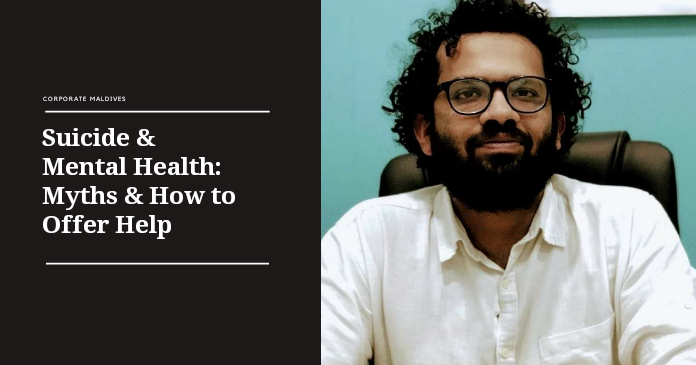
With rising awareness about mental health, a lot of people have begun to feel comfortable talking about their mental health challenges and seeking help. There is also a promising rise in the acceptance of mental health challenges and conditions. Suicide or suicidal thoughts and plans is a very serious symptom of severe mental illness.
Suicide is the act of killing yourself, most often as a result of depression or other mental illness. One in five people worldwide has had suicidal thoughts at some point in their lives. 90% of people who die from suicide have one or more mental health conditions, with depression accounting to 70% of this. Suicide is a very prevalent problem in the Maldives as well. As of 2017 according to WHO data, suicide accounts for 3% of total deaths in the Maldives, and is the 10thmost likely killer, way above lung cancer, drowning, and road traffic accidents.
There are several misconceptions about suicide that exists in our society. There is a prevalent idea that talking about suicide can encourage people to kill themselves. However, not being able to talk about suicidal ideation, further strengthens feelings of being trapped and gives weightage to the idea that there are no other options but suicide. Talking brings support and other perspectives.
There is also an incorrect, unhealthy belief that Only people with a mental health illness die from suicide. There are lots of people with psychological disorders that do not have any suicidal ideation and not all who die from suicide have a psychological disorder. Stressful life events, illness, environmental factors all can contribute to suicide.

People often do not choose to kill themselves suddenly, without warning. Usually, there are certain warning signs that can be seen such as:
- School problems, such as missing classes, truancy, and a sudden change in grades
- Frequent incidents of self-destructive behavior, such as careless accidents
- Loss of appetite or excessive eating
- Withdrawal from friends and peers
- Sleeping problems
- Increased use of alcohol or drugs
- Signs of depression, tearfulness, or overt indications of psychological difficulties, such as hallucinations
- Talking about hopelessness and having no reason to live
- Talking about being a burden to others
- Sudden, drastic changes in appearance
- A preoccupation with death, an afterlife, or what would happen “if I died”
- Putting affairs in order, such as giving away prized possessions or making arrangements for pets to be taken care of
- Visiting or calling people to say goodbye directly or indirectly
- Sudden period of elation or recovery after a period of depression
It’s important for us as individuals and as a society to be helpful supports to people who are at risk for suicide. Some of the ways in which we can do that are:
- Be mindful about the warning signs in your friends, family and coworkers
- If you are worried about someone (they are displaying signs/you have a gut feeling from your interaction with them etc.,) ask directly about suicide. Asking about suicide directly does not “give people the idea to kill themselves.” With the stigma about suicide that is prevalent, it is helpful to be asked directly
- Take people’s suicidal ideation very seriously. Even if they have talked about suicide before and not acted, take each individual instance seriously.
- Try not to react with panic. Hearing about someone’s suicidal ideation is very anxiety-provoking, but a calm demeanor goes a long way in making the other person comfortable
- Be honest and direct. It’s okay to tell people you are worried about them. It’s okay to ask about their suicidal ideation. It’s okay to use the word suicide. Don’t beat around the bush. Say exactly what you mean. It gives the impression that you are comfortable talking to them.
Ask:
- “Are you having thoughts of
suicide?” OR
- “Have you been thinking about killing yourself?”
Avoid:
- “You’re not going to do anything
silly are you?” OR
- “Are you thinking of ending it all?”
- Have a non-judgmental conversation. It is important to listen to other people and not make judgments. It is important to listen and try to understand the reasons that make them want to kill themselves and the emotional state they are in. Refrain from being too talkative and telling them they are wrong. Try to empathize. Refrain from pointing out the positives in their lives or using humor to diffuse the tension you feel. Refrain from taking a moral or religious stance.
- Ask if they have planned out their suicide. If they have it is important to get help as soon as possible
- Convince them about the importance of getting help. If you are really worried about the person’s safety, don’t leave them alone. Call the relevant authorities or professionals and seek help
- Self-care is very important. Understand recognize your limitations and be vigilant about your own mental health needs, support needs and so on. You cannot be helpful to someone if you invest too much in trying to help them and refrain from taking care of yourself. Make a good, informed decision about how much you can help and how much external and specialized help is necessary.
- Sometimes, despite our best effort as family members, as friends, as coworkers, as mental health professionals and members of society, we still do lose our loved ones to suicide. It is important to not blame yourself or blame them either. It is important to forgive and if you have trouble doing it yourself, seek professional help to explore these emotions.
Guest Writer: Aaiz Ahmed Rasheed
Aaiz is a practicing psychologist, who is also a lecturer at the Faculty of Health Sciences, MNU and Co-founder and Vice President of Comma, a civil society organization dedicated to mental health promotion.












